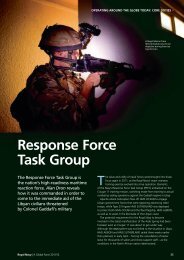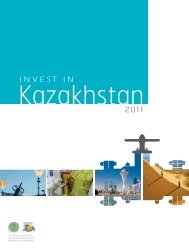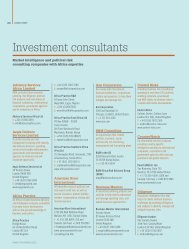NIGERIA Invest in 2012-13 - Newsdesk Media
NIGERIA Invest in 2012-13 - Newsdesk Media
NIGERIA Invest in 2012-13 - Newsdesk Media
You also want an ePaper? Increase the reach of your titles
YUMPU automatically turns print PDFs into web optimized ePapers that Google loves.
112<br />
OIL, GAS AND MINERALS<br />
The new Lekki Free Trade Zone has already attracted more<br />
than a hundred foreign and domestic <strong>in</strong>vestors<br />
The CBN estimates that Nigeria is host to more than<br />
40 million hectares of arable land, but less than 60 per cent<br />
of it is cultivated. Moreover, fertiliser use per hectare stands<br />
at around 10 kilogrammes, compared to a global average of<br />
150 kilogrammes. Despite such vast agricultural potential,<br />
Nigeria’s food import bill stood at N25 trillion ($154 billion)<br />
<strong>in</strong> 2010 – N356 billion ($2 billion) of which was spent on<br />
import<strong>in</strong>g rice. Decades of neglect has condemned the<br />
country to the status of a net food importer, when it should<br />
be Africa’s biggest net food exporter.<br />
<strong>Invest</strong>ments <strong>in</strong> agriculture<br />
Nigeria’s food self-sufficiency drive, which began under former<br />
president Olusegun Obasanjo, has accelerated markedly under<br />
Jonathan, and is now witness<strong>in</strong>g substantial new <strong>in</strong>vestments<br />
<strong>in</strong> agricultural extension, <strong>in</strong>creased fertiliser production, a<br />
significant expansion <strong>in</strong> rice-mill<strong>in</strong>g facilities, and the<br />
development of new agro-process<strong>in</strong>g <strong>in</strong>dustries.<br />
The development of free<br />
trade zones will benefit<br />
manufactur<strong>in</strong>g output<br />
INvESt IN <strong>NIGERIA</strong> <strong>2012</strong>-<strong>13</strong><br />
In addition, the CBN has also earmarked $500 million<br />
<strong>in</strong> new lend<strong>in</strong>g to the agricultural sector, aimed at help<strong>in</strong>g to<br />
unlock more than $3 billion <strong>in</strong> new private-sector lend<strong>in</strong>g<br />
to agriculture over the next decade. Lend<strong>in</strong>g to agriculture<br />
currently accounts for two per cent of total lend<strong>in</strong>g –<br />
compared to six per cent <strong>in</strong> Kenya. The CBN wants that figure<br />
to more than triple to seven per cent by 2020. At present,<br />
Nigeria boasts a mere 30,000 tractors to work more than<br />
40 million hectares of land. No other statistic captures the<br />
scale of the sector’s past neglect – or the opportunity that now<br />
exists to radically transform the country’s agricultural potential.<br />
Like most other emerg<strong>in</strong>g markets, Nigeria has<br />
attempted to augment its manufactur<strong>in</strong>g output through the<br />
development of free trade zones – of which there are some 24<br />
currently <strong>in</strong> operation, admittedly with mixed success. More<br />
recently, however, it has succeeded <strong>in</strong> attract<strong>in</strong>g the attention<br />
of Ch<strong>in</strong>a, Saudi Arabia and India, who are spearhead<strong>in</strong>g<br />
substantial <strong>in</strong>vestment <strong>in</strong>to two new free trade zones designed<br />
to boost Nigeria’s manufactur<strong>in</strong>g output.<br />
Nigeria and Ch<strong>in</strong>a are currently develop<strong>in</strong>g the new Lekki<br />
Free Trade Zone on the eastern edge of Nigeria’s commercial<br />
capital, Lagos. The $5 billion, 3,000-hectare, first phase of<br />
the development – which seeks to reduce the country’s<br />
dependence on imported products – has already attracted<br />
more than 100 foreign and domestic <strong>in</strong>vestors, <strong>in</strong>clud<strong>in</strong>g<br />
Ch<strong>in</strong>ese electronics, pharmaceutical and heavy mach<strong>in</strong>ery<br />
firms, which are eager to build production and assembly<br />
facilities <strong>in</strong> the zone.<br />
The proposed new Koko Free Trade Zone <strong>in</strong> Delta State,<br />
which is backed by a jo<strong>in</strong>t venture between the Nigerian<br />
National Petroleum Corporation and Saudi Arabia’s Xenel<br />
to build a new petrochemical plant, along with plans by<br />
India’s Nagarjuna Chemicals to build three new fertiliser<br />
plants, represents a significant break with the past. The<br />
Lekki and Koko projects are major <strong>in</strong>vestments that seek<br />
to reverse decades of decl<strong>in</strong>e <strong>in</strong> manufactur<strong>in</strong>g. They are<br />
<strong>in</strong>deed ambitious. But they also represent a mark of<br />
confidence <strong>in</strong> Nigeria’s long-term future by <strong>in</strong>dustry<br />
leaders who have a proven track record <strong>in</strong> develop<strong>in</strong>g<br />
effective free trade zones. ■







